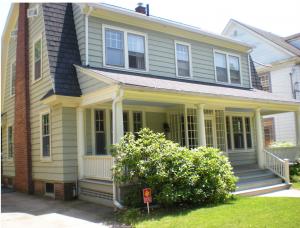Definitions: Rent-to-Own Homes
The popularity of rent-to-own homes has been increasing ever since the housing market crashed. With so many people down on their luck and so many houses available for sale, it can make sense for both parties to set up a rent-to-own agreement. Why? And how does this real estate transaction work? Well, let's take a look.
The Basics
Let's begin with the basics. A rent-to-own agreement is very similar to a car lease. Just like in a lease agreement, the buyer is able to rent the home for a specified period of time. But that rent is not just rent; a portion of the monthly payment is set aside as credit for an eventual purchase of the property.
So, basically, both parties get help in this agreement. A seller who is having trouble selling can rent the property with the understanding that it will be purchased by the renter in a few years. A renter who cannot afford the down payment on a house doesn't have to throw money away on rent; some of the total rent fees that they pay over the rental portion of the rent-to-own agreement will be credited toward the purchase price in a few years.
Beyond the Basics
Of course, not everything is so cut and dried. There are some nitty-gritty details in a rent-to-own agreement that will need to be ironed out. First, you'll need a contract, and the best way for both the buyer and seller to make sure the contract fits their needs is to hire attorneys (one attorney for each side).
The contract should detail the total purchase price of the home at the end of the rental period, the rental price, the monthly dollar amount going toward the purchase (called the rent premium), and the "down payment" (called the option fee in a rent-to-own agreement). Let's look at these more closely.
- Total Purchase Price – The renter and seller will agree upon a final purchase price at the time that the rental agreement is drawn up. This can be a little tricky because once the contract is signed, the total purchase price is set in stone. If the value of the home increases or decreases over the rental period, one of the parties may suffer consequences.
- Rental Period – When the contract is set up, the renter and seller will agree upon a time period for rental. This is usually somewhere between one and three years. At the end of this rental period, the buyer will have the option to purchase the home.
- Rental Price – The contract will also lay out how much the renter will pay in rent each month. This amount is generally fair market rental price, and none of this rent will be credited to the renter at the time of purchase.
- Rent Premium –Beyond the rental price, the renter will also pay a rent premium. This dollar amount will be paid on a monthly basis, above and beyond the normal rent, but the rent premium is the portion of rent that will be credited to the renter at the time of purchase.
- Option Fee – The option fee is basically a relatively low down payment paid to the seller at the time that the rent-to-own agreement is signed. Although the option fee can run into thousands of dollars in upfront fees, it will be applied to the sale at the end of the rental period.
That's the basics of a rent-to-own housing agreement. It can be a great option for both parties, but both should also be aware that rent-to-own does not guarantee a purchase at the end of the agreement. For example, if the renter is still unable to qualify for a home loan after the rental period, the agreement is null and void – and the renter will not receive the rent premium or option fee back. Similarly, a seller who is counting on the renter buying at the end could be surprised to find the renter has decided not to purchase. The bottom line? Rent-to-own can be a great option, but it does have its faults: be sure to research the ins and outs of this rental agreement before signing the dotted line.
- Login to post comments
-







Miss T @ Prairie Eco-Thrifter wrote:
Mon, 04/16/2012 - 14:23 Comment #: 1I have heard about rent to own and the advantages but I haven't seen it practiced much where I live. Before I embarked on it I would like to see it's popularity increased a bit more.
femmefrugality wrote:
Mon, 04/16/2012 - 19:00 Comment #: 2I've always been curious about this. It's sounded like a great option but at the same time too good to be true. Thanks so much for all the info....it may be an option for us further down the line, but it's good to know the things to be cautious of, too!
Christa Palm wrote:
Mon, 04/16/2012 - 21:30 Comment #: 3Miss T, I agree that it's not necessarily the most popular option, and for good reason: the renter isn't necessarily coming out financially ahead. It might be a good option for those who cannot qualify for a loan right now but are sure they'll qualify in a few years. For everybody else, it's often better to buy upfront.
Femme Frugality, glad I could help! If you can go the traditional home-buying route, though, it's often more financially beneficial.
LifeInTransition wrote:
Wed, 04/25/2012 - 21:02 Comment #: 4I didn't know what rent to own meant either. Thanks for the info!
Christa Palm wrote:
Thu, 04/26/2012 - 16:58 Comment #: 5Welcome, LifeInTransition! I like your blog -- I'll be stopping by soon!